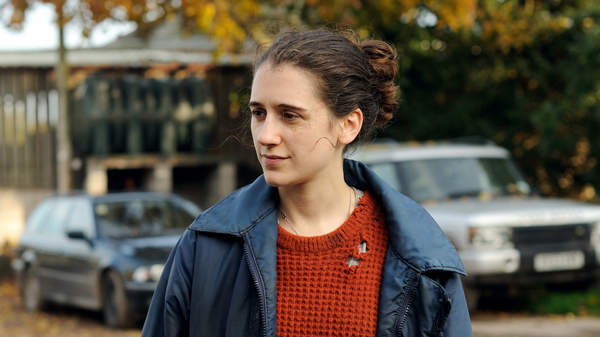A father and daughter relationship is dissected to pulsing viscera in an assured debut feature that portrays a family drama using the tone of a horror movie. An astonishing opening sequence establishes this mood of menace; disembodied yells and shouts, interspersed with slow-motion shots of a drunken party descending into some pagan bacchanal right out of Donna Tartt’s The Secret History. This is rural England; and all is far from well.
Trainee vet Clover (Ellie Kendrick) returns to the desolately beautiful Somerset farm on which she grew up after her brother commits suicide by gunshot at the party. She has a historically testy relationship with her father Aubrey (David Troughton), who she calls only by name, as if he’s failed some parental test that would earn the epithet “Dad”. This is the battleground upon which the film takes place. Themes of rural poverty, the brutality of nature and the deep scars families can inflict on each other are depicted in great clods of mud, bursts of rain, and impending financial ruin.
Kendrick and Troughton are both tremendous in roles that bear the strain of the narrative Atlas-like on their shoulders. Dialogue is sparse and terse, and the sense of their history is moulded from the silences and pained glances between them. Kendrick, a reliable support player in the ensemble of Game of Thrones, and unnecessary nostalgic fluff like Whisky Galore, is especially great in her first leading film role.
It could be because The Levelling relies on understatement, but there is occasionally a lack of momentum. Scenes seem to come and go in a drift of sorrow and silence. While this gives the sense of some dam waiting to break (really, you couldn’t pack enough watery metaphors in when discussing this film), there is a sense of perpetual delayed gratification. We’re left wondering if there’s going to be some awful revelation along the lines of Vinterberg’s Festen (still the high watermark for the portrayal of family dysfunction), or a lurch into the folk horror of Ben Wheatley’s Kill List, but Dickson Leach eschews any obvious resolutions or points of reference. While admirable, it proves a little frustrating.
Ultimately however, this is criticising a work for achieving its aims. Perhaps it’s because the characters are so well inhabited, that we yearn for closure and a sense of beckoning happiness round the corner. In a way, The Levelling really is a horror film, showing the terror of uncertainty and the indelible scars of grief, like the implacable force of nature that’s riven the central family, as being ferociously red in tooth and claw. This is a film the power of which isn’t immediately apparent, but will seep into your subconscious like blood into the boggy earth.
